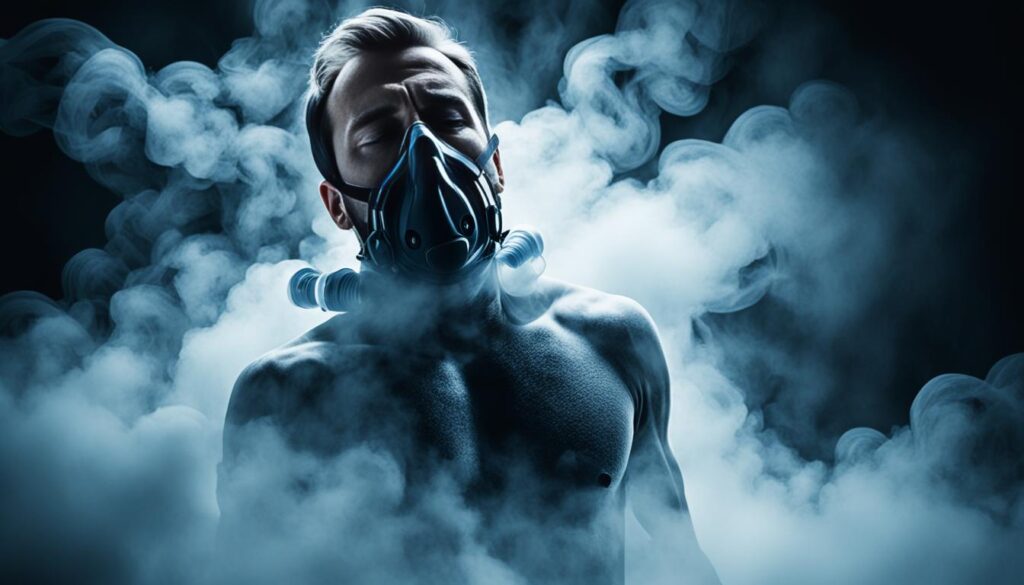
Symptoms Black Mold Exposure: Signs to Watch For
Black mold exposure can have serious health implications, causing a range of symptoms in individuals who come into contact with it. Recognizing these symptoms is crucial in order to take prompt action and protect your well-being. Whether you suspect black mold presence in your home or workplace, being aware of the signs to watch for can help you seek the necessary assistance and prevent further health complications.
Key Takeaways:
- Black mold exposure can lead to a variety of symptoms.
- Respiratory symptoms such as coughing, wheezing, and shortness of breath are common.
- Allergic reactions, including sneezing, itchy eyes, and skin rashes, can also occur.
- It is important to seek professional help for mold assessment and remediation if symptoms arise.
- Stay informed and take proactive measures to ensure a healthy environment for you and your loved ones.
Respiratory Symptoms Associated with Black Mold Exposure
One of the primary concerns when it comes to black mold exposure are the respiratory symptoms that may arise. These symptoms can be particularly problematic for individuals with pre-existing respiratory conditions, such as asthma or chronic bronchitis. It is important to understand and recognize the signs in order to take appropriate action for your health.
Respiratory symptoms that can be triggered by black mold exposure include:
- Coughing
- Wheezing
- Shortness of breath
- Nasal congestion
These symptoms can range from mild to severe, depending on the individual and the extent of exposure. For some people, these respiratory symptoms may only occur when they are in close proximity to the black mold. For others, the symptoms may persist and worsen over time. It is crucial to address these symptoms and seek appropriate medical attention to prevent further complications.

It is important to note that individuals with compromised immune systems, such as those undergoing cancer treatment or with HIV/AIDS, may be more susceptible to the respiratory effects of black mold exposure. Furthermore, prolonged exposure to black mold can lead to chronic respiratory problems.
“Respiratory symptoms triggered by black mold exposure can significantly impact the quality of life and overall health of affected individuals.”
Preventing and Addressing Respiratory Symptoms
If you suspect black mold in your environment and are experiencing respiratory symptoms, it is essential to take action. Here are some steps to consider:
- Identify and remove the source of moisture that is causing the mold growth.
- Seek professional help for mold assessment. Contact a trusted mold remediation specialist like Fix Mold Miami for a thorough assessment and guidance on mold removal.
- Improve ventilation and reduce humidity levels in your home or workplace to prevent mold growth.
- If necessary, consult with a healthcare professional to address and manage your respiratory symptoms.
By taking proactive measures to prevent and address black mold exposure, you can safeguard your respiratory health and well-being. Stay vigilant, prioritize your health, and seek professional assistance when needed to create a safe and mold-free environment for yourself and your loved ones.
| Respiratory Symptoms | Prevalence |
|---|---|
| Coughing | Common |
| Wheezing | Frequent |
| Shortness of breath | Common |
| Nasal congestion | Common |
Allergic Reactions Caused by Black Mold Exposure
Black mold exposure can also lead to allergic reactions in some individuals. These reactions may involve symptoms such as sneezing, itchy and watery eyes, skin rashes, and throat irritation. It is important to note that these allergic reactions can vary in severity depending on the individual.
Some individuals may experience mild allergic reactions, such as occasional sneezing or itchy eyes, while others may have more severe symptoms that significantly impact their daily lives.
For those with pre-existing allergies or asthma, black mold exposure can worsen their symptoms and trigger asthma attacks. It is crucial for individuals who are already prone to allergic reactions to be especially cautious in environments where black mold may be present.
“Allergic reactions caused by black mold exposure can vary from mild to severe, depending on the individual’s sensitivity. It is important to seek medical attention if you experience persistent or severe allergic symptoms after exposure to black mold.”
If you suspect that your symptoms may be due to black mold exposure, it is recommended to consult with a healthcare professional. They can conduct appropriate tests to determine if your symptoms are indeed the result of an allergic reaction to black mold.
Avoiding exposure to black mold is the best way to prevent allergic reactions. If you discover black mold in your home or workplace, it is important to take immediate action to remove it and address the underlying cause of the moisture problem.

Note: The image above depicts the potential allergic reactions caused by black mold exposure.
Conclusion
In conclusion, being aware of the symptoms associated with black mold exposure is crucial to protecting your health. The respiratory symptoms, including coughing, wheezing, shortness of breath, and nasal congestion, can greatly impact individuals, especially those with pre-existing respiratory conditions like asthma. Additionally, allergic reactions triggered by black mold exposure, such as sneezing, itchy and watery eyes, skin rashes, and throat irritation, can vary in severity for each person.
If you suspect black mold in your environment and experience any of these symptoms, it is highly recommended to seek professional help for mold assessment and remediation. One of Florida’s highest-rated services is Fix Mold Miami, known for their expertise in mold assessments, prevention, and remediation. They can be reached at 305-465-6653 to schedule a mold assessment and take the necessary steps to eliminate the mold problem from your home or workplace.
Stay informed about black mold and take proactive measures to ensure a healthy environment for yourself and your loved ones. Investing in proper mold assessment and remediation can help mitigate the risks associated with black mold exposure and safeguard your respiratory health.




